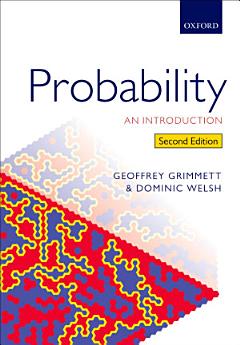Probability: An Introduction, Edition 2
ສ.ຫ. 2014 · OUP Oxford
ປຶ້ມອີບຸກ
288
ໜ້າ
family_home
ມີສິດ
info
reportບໍ່ໄດ້ຢັ້ງຢືນການຈັດອັນດັບ ແລະ ຄຳຕິຊົມ ສຶກສາເພີ່ມເຕີມ
ກ່ຽວກັບປຶ້ມ e-book ນີ້
Probability is an area of mathematics of tremendous contemporary importance across all aspects of human endeavour. This book is a compact account of the basic features of probability and random processes at the level of first and second year mathematics undergraduates and Masters' students in cognate fields. It is suitable for a first course in probability, plus a follow-up course in random processes including Markov chains. A special feature is the authors' attention to rigorous mathematics: not everything is rigorous, but the need for rigour is explained at difficult junctures. The text is enriched by simple exercises, together with problems (with very brief hints) many of which are taken from final examinations at Cambridge and Oxford. The first eight chapters form a course in basic probability, being an account of events, random variables, and distributions - discrete and continuous random variables are treated separately - together with simple versions of the law of large numbers and the central limit theorem. There is an account of moment generating functions and their applications. The following three chapters are about branching processes, random walks, and continuous-time random processes such as the Poisson process. The final chapter is a fairly extensive account of Markov chains in discrete time. This second edition develops the success of the first edition through an updated presentation, the extensive new chapter on Markov chains, and a number of new sections to ensure comprehensive coverage of the syllabi at major universities.
ກ່ຽວກັບຜູ້ຂຽນ
Geoffrey Grimmett is Professor of Mathematical Statistics at the University of Cambridge and Master of Downing College, Cambridge. His research interests lie in disordered physical systems, including percolation and related processes. He has written numerous research articles in probability theory and statistical mechanics, as well as three research books and two successful textbooks on probability and random processes at the undergraduate and postgraduate levels. Dominic Welsh is Professor Emeritus of Mathematics at the University of Oxford and Emeritus fellow of Merton College, Oxford. He held the John von Neumann Professorship at Bonn in 1990-91, and was appointed Professor of Mathematics at Oxford in 1993. His research interests include combinatorics and complexity theory, and he has written more than a hundred papers in these areas. He retired from Oxford University in 2005, and has since then held visiting positions in New Zealand and Barcelona.
ໃຫ້ຄະແນນ e-book ນີ້
ບອກພວກເຮົາວ່າທ່ານຄິດແນວໃດ.
ອ່ານຂໍ້ມູນຂ່າວສານ
ສະມາດໂຟນ ແລະ ແທັບເລັດ
ຕິດຕັ້ງ ແອັບ Google Play Books ສຳລັບ Android ແລະ iPad/iPhone. ມັນຊິ້ງຂໍ້ມູນໂດຍອັດຕະໂນມັດກັບບັນຊີຂອງທ່ານ ແລະ ອະນຸຍາດໃຫ້ທ່ານອ່ານທາງອອນລາຍ ຫຼື ແບບອອບລາຍໄດ້ ບໍ່ວ່າທ່ານຈະຢູ່ໃສ.
ແລັບທັອບ ແລະ ຄອມພິວເຕີ
ທ່ານສາມາດຟັງປຶ້ມສຽງທີ່ຊື້ໃນ Google Play ໂດຍໃຊ້ໂປຣແກຣມທ່ອງເວັບຂອງຄອມພິວເຕີຂອງທ່ານໄດ້.
eReaders ແລະອຸປະກອນອື່ນໆ
ເພື່ອອ່ານໃນອຸປະກອນ e-ink ເຊັ່ນ: Kobo eReader, ທ່ານຈຳເປັນຕ້ອງດາວໂຫຼດໄຟລ໌ ແລະ ໂອນຍ້າຍມັນໄປໃສ່ອຸປະກອນຂອງທ່ານກ່ອນ. ປະຕິບັດຕາມຄຳແນະນຳລະອຽດຂອງ ສູນຊ່ວຍເຫຼືອ ເພື່ອໂອນຍ້າຍໄຟລ໌ໄໃສ່ eReader ທີ່ຮອງຮັບ.






